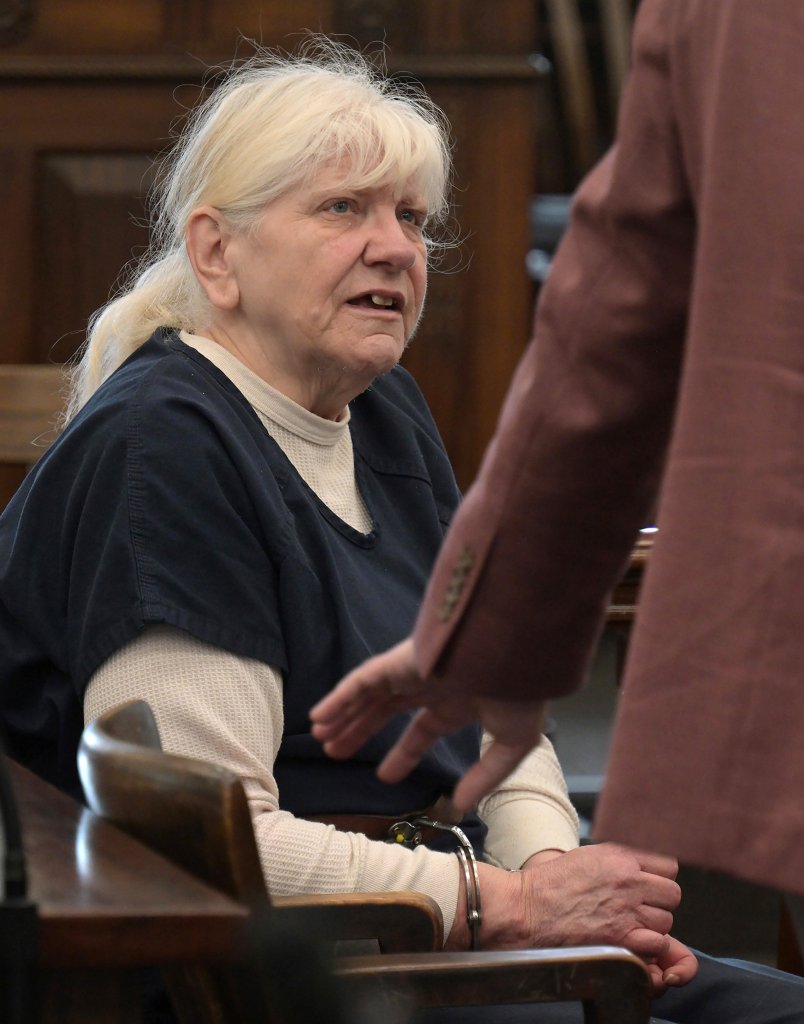SKOWHEGAN — A judge ordered a Garland woman accused of killing her 78-year-old sister to be held without bail following a hearing Thursday in which her attorneys attempted to poke holes in the state police’s investigation into the death.

That means Bonnie Coombs, 69, will remain in county jail while she awaits a trial. Coombs is charged with intentional or knowing murder for the shooting death of her sister, Velma Withee, in Hartland in April; she pleaded not guilty in August.
Superior Court Chief Justice Robert E. Mullen made the ruling after hearing hours of testimony Thursday, mostly from the Maine State Police detective assigned to the case as the primary investigator.
Mullen found there was sufficient probable cause that Coombs committed the crime of murder. He also found that Coombs will pose a danger to another or to the community, which is one of three factors under Maine’s bail code that judges may consider in setting bail in a murder case after finding probable cause, and noted the circumstances of the alleged crime.
Mullen, however, said the attorney general’s office, which prosecutes all murder cases in the state, has indicated the earliest it is scheduling trials for pending murder cases is late 2026. He called that unacceptable, and said that if there are any delays in Coombs’ case, her attorneys can request a review of his bail decision.
Coombs, shackled and escorted by jail transport officers, left the courtroom crying loudly after the hearing.
Police and prosecutors believe Coombs shot and killed Withee on April 9, according to court filings and testimony at the hearing. Three days later, Withee’s son and daughter-in-law found her dead, lying on her back between a pickup truck and camper trailer outside her home at 456 Canaan Road in Hartland.
The Somerset County Sheriff’s Office responded and requested assistance from major crimes detectives.
Several items were placed around the body, which was partially covered by a tarp, and blood was visible on Withee’s clothing and body, according to police affidavits.
Two days later, the Office of Chief Medical Examiner ruled Withee’s death a homicide and determined the cause to be multiple gunshot wounds to her head.
But authorities did not announce that her death had been ruled a homicide to the public until two weeks later. And they withheld the cause of Withee’s death until announcing Coombs’ arrest in June.
Largely drawing on information already outlined in police affidavits, Assistant Attorney General Mark Rucci said in his closing argument that police determined Coombs was the last person to see her sister alive.
The two were seen together on Withee’s route for her trash collection business April 9, Rucci said. The clothes Withee was wearing that day matched the clothes found on her dead body.
Investigators also found that Withee did not annotate her calendar, which she did daily, after the morning of April 9, Rucci said.
Blood found in Coombs’ vehicle, seized with a search warrant, matched Withee’s DNA profile, Rucci said. Investigators also found a small caliber bullet that also matched Withee’s DNA profile.
Coombs also left three voicemail messages for Withee in the days after her death, which police have characterized as an attempt to make it seem like she was unaware of the killing.
Police had other reasons to suspect Coombs, based on their interviews with her and what she told others about Withee’s death.
“She has a lot of information that she would have no reason to know, unless she had intimate knowledge of the details of the crime,” Rucci said.
Coombs’ court-appointed attorneys, James Howaniec and Mitchel Roberge, asked Mullen to allow bail with several possible conditions, including house arrest and once-a-day check-ins at the Somerset County Sheriff’s Office. Roberge, in his closing argument, noted Coombs’ age and said she and her husband both have medical issues.
The defense attorneys argued there was not probable cause that Coombs committed the murder, pointing to apparent holes in the state police investigation.
“We don’t have a murder weapon,” Roberge said. “We don’t have a firearm in Bonnie’s hand, ever. We don’t have any evidence tying the bullet in the car to Bonnie. We don’t have any evidence that Bonnie even handled a gun at all. We don’t have any evidence of gunshot residue inside the vehicle where they’re saying the murder allegedly occurred. We don’t have any evidence of Bonnie’s DNA anywhere on Velma’s body.”
On the witness stand, Detective Logan Roberts, the primary investigator assigned to the case, said he had not reviewed the entire case file. Roberts, with the Maine State Police Major Crimes Unit — Central, said he was away for a total of 10 weeks over the summer for training and was unsure if another detective was assigned to cover for him.
Questioned at length by Howaniec, Roberts also said he had only seen one of the two bullets investigators recovered and was unsure if there was any planned testing for gunshot residue in Coombs’ vehicle or blood spatter analysis.
Roberts testified that the investigation is ongoing, including a ballistics report from the state crime lab that remains pending. Asked if he has ever followed up on its status, Roberts said he has not, as he was not assigned to do so.
Howaniec also questioned, among other aspects of the investigation, why detectives did not take footprints and other evidence from the scene where Withee’s body was found.
“From the evidence that we’ve heard today, it sounds like they’ve done barely anything at this point,” Roberge said of the investigation during his closing.
Police have not yet determined a clear motive for Coombs’ alleged killing of her sister.
“The only thing would be, in her first interview, she discussed her and her sister having an argument before her departure on April 9, 2025,” Roberts said, answering a question from Howaniec. “Otherwise, on that, no.”
